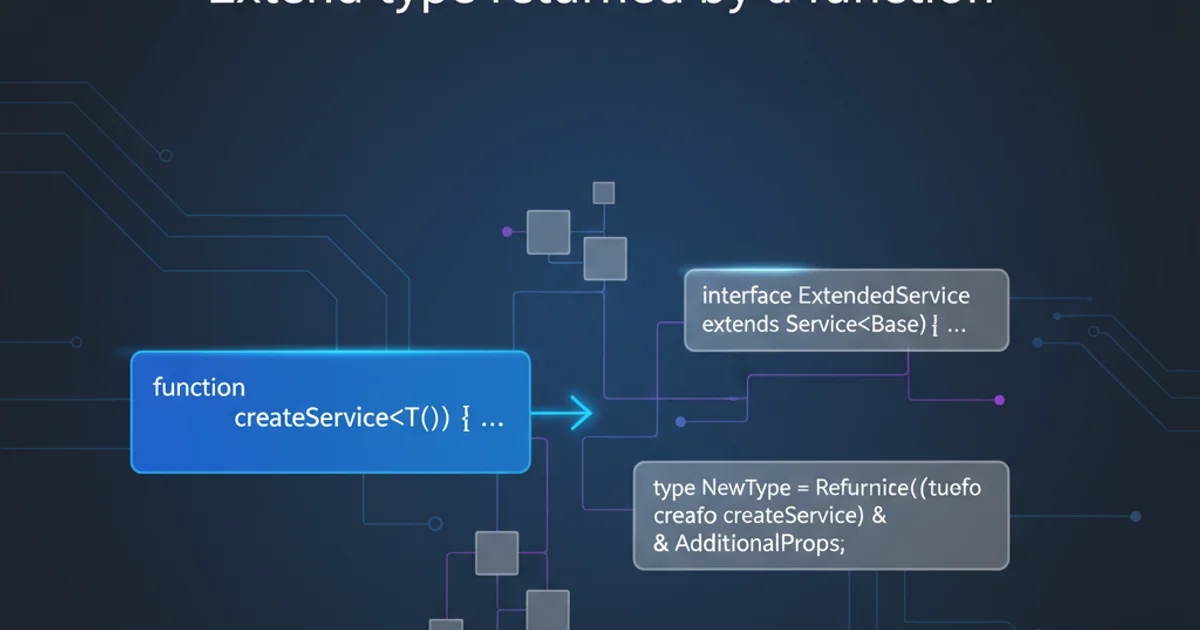TypeScript - Extend type returned by a function
Categories:
TypeScript: Extending Types Returned by Functions

Learn how to effectively extend and augment the type of an object returned by a function in TypeScript, enhancing type safety and developer experience.
In TypeScript, functions often return objects with specific types. However, there are scenarios where you might need to add new properties or modify existing ones on the returned object's type without directly changing the function's original return type definition. This article explores various techniques to achieve this, focusing on type safety and maintainability.
The Challenge: Augmenting Function Return Types
Consider a utility function that creates a basic object. If you later want to add more properties to this object based on some logic, how do you inform TypeScript about these new properties? Simply assigning new properties at runtime won't update the type, leading to potential type errors when trying to access them. This is where type extension comes into play.
flowchart TD
A[Function Returns Base Type] --> B{Need Additional Properties?}
B -- Yes --> C[Augment Return Type]
C --> D[Use Extended Type]
B -- No --> E[Use Base Type]
D --> F[Type-Safe Access]
E --> FWorkflow for augmenting function return types
Method 1: Type Assertion (as)
The simplest, though often least type-safe, way to tell TypeScript about additional properties is using a type assertion. This forces TypeScript to treat an expression as a specific type. While quick, it bypasses type checking and can hide real errors if the assertion is incorrect.
interface BaseObject {
id: string;
name: string;
}
interface ExtendedObject extends BaseObject {
createdAt: Date;
}
function createBaseObject(id: string, name: string): BaseObject {
return { id, name };
}
const obj = createBaseObject('123', 'Test Item');
// Type assertion to add 'createdAt'
const extendedObj = { ...obj, createdAt: new Date() } as ExtendedObject;
console.log(extendedObj.createdAt.toISOString()); // No type error, but relies on assertion
Extending a type using type assertion
as) should be used with caution. They tell TypeScript to trust you, which can lead to runtime errors if the asserted type doesn't match the actual object structure.Method 2: Using Generics and Intersection Types
A more robust and type-safe approach involves using generics in conjunction with intersection types (&). This allows you to define a function that takes a base type and returns a new type that combines the base type with additional properties, all while maintaining strong type checking.
interface BaseObject {
id: string;
name: string;
}
function createBaseObject(id: string, name: string): BaseObject {
return { id, name };
}
// Function to extend the base object with a 'createdAt' property
function addTimestamp<T extends BaseObject>(obj: T): T & { createdAt: Date } {
return { ...obj, createdAt: new Date() };
}
const baseItem = createBaseObject('456', 'Another Item');
const timestampedItem = addTimestamp(baseItem);
console.log(timestampedItem.id); // '456'
console.log(timestampedItem.createdAt.toISOString()); // Type-safe access
// Example with a different extension
function addStatus<T extends BaseObject>(obj: T, status: string): T & { status: string } {
return { ...obj, status };
}
const statusItem = addStatus(baseItem, 'active');
console.log(statusItem.status); // 'active'
Extending types using generics and intersection types
Method 3: Function Overloads for Specific Extensions
If you have a limited set of predefined extensions, function overloads can be a clean way to express different return types based on input parameters. This is particularly useful when a function's behavior (and thus its return type) changes predictably based on certain arguments.
interface User {
id: number;
name: string;
}
interface UserWithEmail extends User {
email: string;
}
interface UserWithPhone extends User {
phone: string;
}
// Overload signatures
function createUser(id: number, name: string, email: string): UserWithEmail;
function createUser(id: number, name: string, phone: string, type: 'phone'): UserWithPhone;
function createUser(id: number, name: string): User;
// Implementation signature
function createUser(
id: number,
name: string,
arg3?: string,
arg4?: 'phone'
): User | UserWithEmail | UserWithPhone {
let user: User = { id, name };
if (arg4 === 'phone' && arg3) {
return { ...user, phone: arg3 };
} else if (arg3) {
return { ...user, email: arg3 };
}
return user;
}
const basicUser = createUser(1, 'Alice'); // Type: User
const userWithEmail = createUser(2, 'Bob', 'bob@example.com'); // Type: UserWithEmail
const userWithPhone = createUser(3, 'Charlie', '555-1234', 'phone'); // Type: UserWithPhone
console.log(userWithEmail.email); // Type-safe
// console.log(basicUser.email); // Error: Property 'email' does not exist on type 'User'
Using function overloads to return different extended types